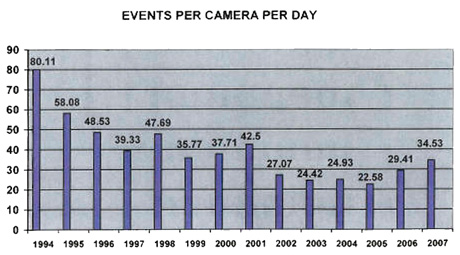Red Light Cam Expansion Gets All Clear From Gantt
 Red-light running "events" have declined dramatically where cameras have been installed. Source: NYCDOT.
Red-light running "events" have declined dramatically where cameras have been installed. Source: NYCDOT.New York City’s red light cam program is on track to expand by 50 percent, pending legislation currently winding through Albany. Since 1994, the city has run a red light camera "demonstration program" — with proven safety benefits — which has to be renewed this year to continue. The bill
would extend that program for five years and increase the number of
cameras from 100 to 150 (here’s the legalese).
Notably, Rochester Assemblymember David Gantt, who has consistently blocked automated enforcement measures from his position as chair of the transportation committee, signaled yesterday that he won’t stand in the way of this one, reports Gannett:
Gantt said Wednesday he will no longer object to the measure and sponsored legislation this week to let Rochester have the cameras, which take snapshots of vehicles that run red lights.
Gantt said he still has reservations about whether the cameras invade privacy and increase safety. But he said legislative leaders and Gov. David Paterson have been pushing for the measure, so Rochester should be included.
Gantt’s openness to new automated enforcement programs is welcome, but the fact that he still harbors reservations about safety benefits suggests he’s not keeping up with the growing body of research on the subject. The Insurance Institute for Highway Safety, in a report released last May, found that red light cameras yielded a 68 percent drop in the number of front-to-side collisions involving injuries. New York City’s own camera program has reduced red-light running at camera-equipped locations by as much as 72 percent. (Both stats are cited in this NYCDOT report [PDF].)
Automated enforcement also figures heavily in plans for Bus Rapid Transit in New York, since planners are counting on bus-mounted cams to help keep exclusive BRT lanes clear of private vehicles. Similar cameras in London have improved bus speeds significantly. The last time bus-cam legislation came up in Albany, civil liberties groups did not raise objections, but Gantt spiked the bill citing worries about Big Brother.